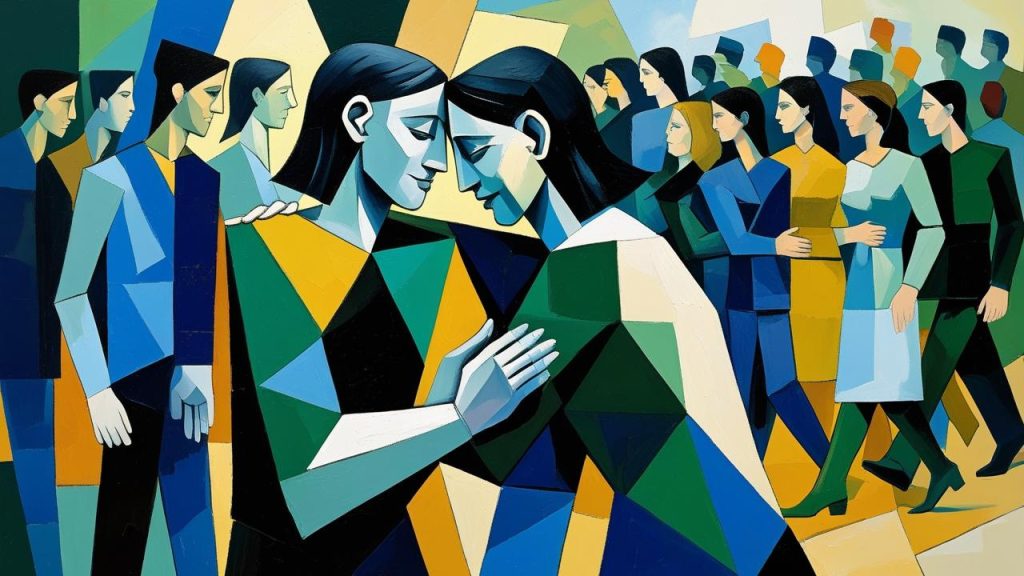Reading time: 5 minutes.

Hi Friend,
It can feel isolating to go through a faith transition—especially when most or all of your community is still in the Church. But even in that loneliness, you are far from alone.
I know it’s not easy. Rob Bell once put it so well:
“Some communities don’t permit open, honest inquiry about the things that matter most. Lots of people have voiced a concern, expressed a doubt, or raised a question, only to be told by their family, church, friends, or tribe: ‘We don’t discuss those things here.’
“But there are communities to discuss those things. Find them.”
Many people have walked this path and found meaningful relationships, new communities, and even deeper connections with family and friends—connections rooted in mutual acceptance rather than shared beliefs.
One of the biggest fears many face is: “Without the church, who am I?”
But your values, your kindness, your integrity—these are not things given to you by an institution. They are part of you. You still get to define what matters most, and you still get to define your community.
Part of that new community can come from finding others who are also in need of support. As BYU professor Daniel Becerra said:
“Throughout His ministry, Jesus had a special relationship with those who were marginalized in society: the poor, the afflicted, the stranger, and others who were often ignored or looked down upon—‘the least of these,’ as He refers to them in the Gospel of Matthew. But He didn’t just minister to these individuals—He saw Himself in them.”
And now, perhaps having experienced marginalization yourself, you can begin to see yourself in others who are struggling. That’s a sacred perspective. If it is in your heart, seek those people out.
Your efforts don’t have to be grand. Peace and togetherness can come through small acts—simply being there for someone else.
Here’s a thought on finding them on your journey: When I was teaching the Old Testament, I found comfort in a beautiful image from the Mishnah, one of the earliest texts of the Talmud. In Midot 2:2, it describes how pilgrims would ascend to the Temple in Jerusalem:
“All who entered the Temple Mount entered by the right and went round to the right and exited on the left—except for those to whom something had happened, who entered and went round to the left.”
Those in grief, distress, or pain would walk the opposite way—a quiet, visible signal to the community. And when someone walking right encountered someone going left, they were required to stop and ask: “What happened to you?”
They would listen, and then they would offer a blessing:
“May He who dwells in this house comfort you.”
“May He who dwells in this house draw you near again.”
“May He who dwells in this house bring you peace.”
Even in a sacred procession, the community paused to recognize those who were suffering. They created a community right at that moment, with each interaction.
As Dietrich Bonhoeffer, the German pastor who was executed during WWII, said:
“The first service one owes to others in a community involves listening to them. Just as our love for God begins with listening to God’s Word, the beginning of love for others is learning to listen to them. God’s love for us is shown by the fact that God not only gives God’s Word but also lends us God’s ear…We do God’s work for our brothers and sisters when we learn to listen to them.”
That kind of listening has helped me immensely. Sometimes it was the friend at church who quietly said, “I know less today than I did ten years ago.” Sometimes it was a text from someone I hadn’t heard from in years. Other times it came from podcasters, writers, and thinkers I’ve never met but who put words to things I was feeling.
And I’ve been incredibly fortunate to have a spouse who is walking her own path of faith expansion, willing to support me—or just sit with me when I need it.
I’ve found an online community where I can be honest. I joined a Zoom book club with like-minded people, and their trust and friendship have been a gift.
I’ve still learning to identify and ask people, “Why are you going around to the left?”—to see those who are suffering and listen to their stories. I’ve tried different ways to build community and reach out. Some worked, some didn’t. But I keep trying.
I can only express to you that there is a community out there for you. I hope you find it, and that you don’t feel alone.
With warmth,
Your Friend
P.S. Can I suggest that you can find a newfound appreciation for giving service without expecting anything in return. Service provides lasting benefits. Not only can you help others in a Christ-like way, it offers a multitude of benefits to you, impacting both mental and physical well-being, and fostering a sense of purpose and connection.
You’ve learned an ethic of service in the LDS tradition, but I’ve observed it’s often tied to ulterior motives or conditions. We frequently serve ourselves as LDS members more than others outside our community. When we do help others, we view it as a missionary opportunity, ready to cap it off with a handshake and invitation to church.
But service can be mutualistic and create a benefit of connection and longstanding relationships without strings attached. It’s pretty liberating.
Just giving and serving without expecting anything in return is a blessing in itself. It doesn’t have to be large. Given that you’re used to serving others, when you do it without expecting anything like a missionary introduction, it can become your superpower.
The benefits of even small acts of service include increased happiness, life satisfaction, reduced stress and anxiety, improved self-esteem, and it’s a bridge to neighbors and your community. So go forward and give it a try!
P.P.S If you’re interested, here are a few books for thinking about building community:
Find Your People: Building Deep Community in a Lonely World by Jenny Allen
The Art of Community: 7 Principles for Belonging by Charles H. Vogl
